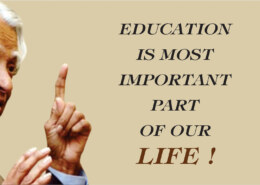How do you feel about tests and examinations? Are they necessary?
Education is incredibly important because it shapes our understanding of the world and equips us with essential skills for life. For those who haven't had the chance to learn to read and write, it's like missing out on a key that unlocks a treasure trove of knowledge and opportunities. Education isnRead more
Education is incredibly important because it shapes our understanding of the world and equips us with essential skills for life. For those who haven’t had the chance to learn to read and write, it’s like missing out on a key that unlocks a treasure trove of knowledge and opportunities. Education isn’t just about going to school; it’s about learning how things work, solving problems, and making informed choices.
Imagine not being able to read a sign or understand directions—it would make navigating life difficult. Education provides us with the tools to communicate effectively, think critically, and adapt to new situations. It empowers individuals to contribute meaningfully to society and pursue their dreams.
Beyond practical skills, education fosters creativity, curiosity, and confidence. It opens doors to better jobs, improved health, and a deeper understanding of different cultures and perspectives. Ultimately, education is like a bridge that connects us to a brighter future, offering the opportunity to learn, grow, and achieve our full potential in life.
Education is incredibly important for our lives, and here’s why, with some engaging examples that show how it helps us become independent:
1. Unlocking Opportunities:
Example: Education opens doors to various jobs. Whether you want to be a farmer, a shop owner, or a doctor, learning helps you improve and become the best in your field, allowing you to rely on your skills.
2. Making Smart Choices:
Example: Think about buying medicine. If you can read, you can understand the instructions and take the right dose. This keeps you healthy and safe without needing someone else to explain it to you.
3. Personal Growth:
Example: Picture being able to read amazing stories and books. You can travel to faraway lands, meet interesting characters, and learn new things—all without needing someone to read to you.
4. Staying Healthy:
Example: If you know about nutrition, you can cook healthy meals for your family. This means fewer trips to the doctor and a healthier life, managed by you.
5. Empowering Yourself:
Example: Imagine you want to vote in an election. If you can read and write, you can understand the candidates’ promises and choose the best one for your community without depending on others for information.
6. Helping Your Kids:
Example: If your child brings home homework, you can help them if you know how to read and write. This means your child does better in school, thanks to your guidance, not needing extra tutors.
7. Joining Your Community:
Example: If you can read, you can help others by reading letters or filling out forms for them. You become a valuable member of your community, contributing independently.
8. Learning New Skills:
Example: Imagine learning how to use a smartphone or a computer. If you can read, you can watch tutorials and follow instructions yourself, making you more self-reliant.
Education is like a magic key that opens many doors. It helps you become more independent, make smart choices, stay healthy, and take care of your family. It empowers you to handle life’s challenges on your own, making you stronger and more capable.
See less

Well in my opinion and I strongly believe that tests and examinations, while often seen as a traditional measure of competence, are not the ultimate indicators of intelligence or capability. They create a high-pressure environment that rewards rote memorization and conformity over creativity and criRead more
Well in my opinion and I strongly believe that tests and examinations, while often seen as a traditional measure of competence, are not the ultimate indicators of intelligence or capability. They create a high-pressure environment that rewards rote memorization and conformity over creativity and critical thinking. The current education system’s overreliance on exams stifles innovation and fails to recognize diverse talents and learning styles.
In reality, life and work are not standardized tests; they are complex, dynamic, and require a multitude of skills that exams cannot measure. We need to pivot towards a more holistic approach that values hands-on experience, collaborative projects, and real-world problem-solving. It’s time to rethink and revolutionize how we assess knowledge and skills, focusing on fostering a passion for learning and the ability to adapt, rather than just the ability to perform under timed conditions.
See less